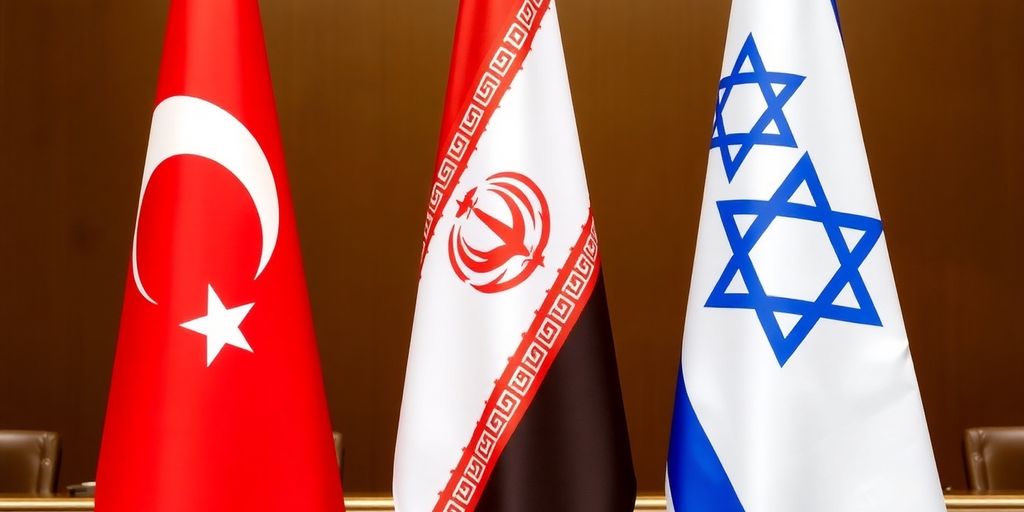Turkey is actively engaging in diplomatic efforts to de-escalate the escalating conflict between Iran and Israel, offering mediation and urging all parties to return to dialogue. President Erdogan has held calls with key regional and international leaders, emphasizing the urgent need to prevent a wider regional war and maintain stability.
Turkey’s Diplomatic Offensive
Turkish President Recep Tayyip Erdogan has initiated a series of high-level phone calls with leaders including Iranian President Masoud Pezeshkian, Russian President Vladimir Putin, and US President Donald Trump. These discussions underscore Turkey’s commitment to preventing further escalation in the Middle East.
- Calls for De-escalation: Erdogan reiterated Turkey’s readiness to facilitate de-escalation and support a return to nuclear negotiations between Iran and Israel.
- Warning Against Regional War: He warned that the cycle of violence, particularly Israel’s actions, threatens regional security and global order, stressing that the region cannot endure another war.
- Focus on Diplomacy: Erdogan emphasized that dialogue is the only viable solution and urged all parties to return to the negotiating table promptly.
- Gaza Humanitarian Crisis: He also cautioned against allowing the current conflict to divert attention from the ongoing humanitarian crisis in Gaza.
US Notification and Regional Tensions
The United States reportedly informed Turkey in advance of Israel’s military strikes on Iran, aiming to mitigate regional fallout. This notification comes amid existing tensions between Turkey and Israel, particularly concerning developments in Syria.
- Pre-strike Notification: The US notified Turkey hours before the Israeli strikes, reportedly to prevent misunderstandings and regional escalation.
- Syrian Airspace Concerns: Israeli fighter jets allegedly used Syrian and Iraqi airspace for the strikes, raising concerns about regional sovereignty and air defense systems.
- Turkish-Israeli Deconfliction: Tensions persist between Turkey and Israel over Turkish military activities in Syria, with ongoing deconfliction talks in Baku.
Debunking Misinformation
Turkey’s Directorate of Communications Center for Countering Disinformation (DMM) has actively debunked claims regarding the Kurecik Radar Station and other misinformation circulating amidst the conflict.
- Kurecik Radar Station: The DMM clarified that data from the Kurecik Radar Station is exclusively shared with NATO allies within a specific framework and is not provided to non-NATO countries like Israel.
- Combating False Narratives: The DMM has addressed various false claims, including those about Iranian citizens queuing at the Turkish border and Israeli aircraft landing in Turkey.
Economic Stability and Future Concerns
Despite the regional turmoil, Turkey’s financial markets have remained relatively stable. However, concerns remain about the potential for a prolonged conflict to lead to increased migration into Turkey.
- Calm Markets: Turkish financial markets, including the USD/Turkish Lira exchange rate and the Borsa Istanbul, have remained stable.
- Migration Impact: A prolonged conflict could lead to a significant influx of new migrants into Turkey, which already hosts a large number of irregular migrants.
Sources
- Türkiye ready to help de-escalate Israel-Iran conflict: Erdogan, TRT Global.
- ISTANBUL BLOG: Ankara denies Nato radar site in Turkey feeds Israel data on incoming
missiles. Try not to snort, bne IntelliNews. - Turkey calls for urgent action to prevent growing Iran-Israel conflict | World News, Hindustan Times.
- Turkey ready to play facilitator role to resolve nuclear dispute, Erdogan tells Trump, Middle East Eye.
- US informed Türkiye ahead of Israeli strikes on Iran: Report, Türkiye Today.






